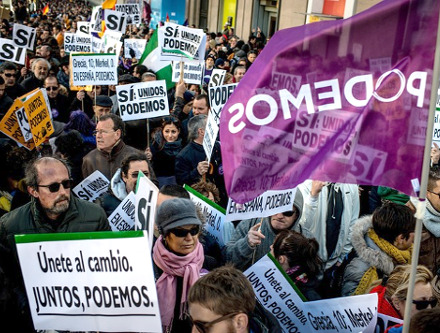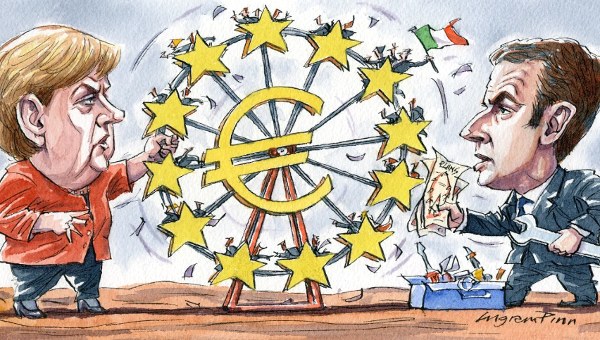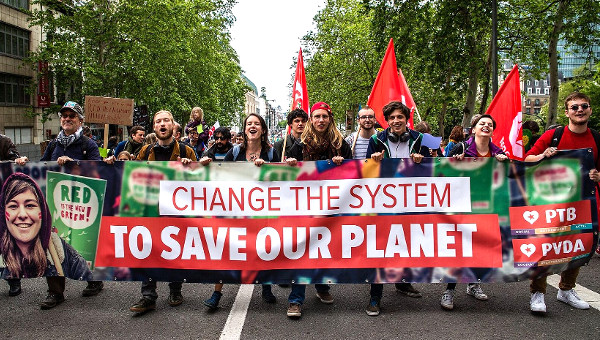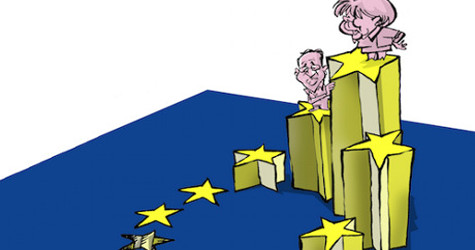Early in February, Australian correspondent Dick Nichols, who reports from Catalonia, was interviewed by Tijmen Lucie of the Dutch Socialist Party monthly magazine Spanning. Below is an edited version of the original interview published on March 1 by Spectrezine.
Tijmen Lucie (TL): First of all what can you tell us about Podemos? How did this political party start?

Dick Nichols (DN): It’s impossible to understand Podemos without grasping the many-sided crisis of Spanish society and the Spanish state. Podemos expresses the anger and hatred toward the Spanish and European establishment felt by millions of people – especially the young – and a deep desire for a radical overhaul of economy, society and state institutions. There are many reasons for this anger, beginning with Spain’s economic crisis. This has created 4.78 million unemployed, kept average pay at its 2001 level, pushed poverty up to record heights (by 2014, 29.2% of the population was in danger of social exclusion), and driven a quarter of a million young people to emigrate.
As for the present Spanish economic ‘recovery’, it is producing a society where the wage share in national income is at its lowest since 1960, where 92 per cent of new work contracts are for casual jobs, and where income inequality is the highest in Europe (with Latvia). Between 2008 and 2011, income for the bottom 10 per cent of Spanish households fell on average by 13%; between 2008 and 2015, over 600,000 home-owners were evicted; in 2015, 770,000 households received not one euro in income. In Spain today, you can work full time and still not be able to make it to the end of the month – not surprising when 5.9 million workers receive less than the monthly ‘minimum’ age of €655.20.
By contrast, the Spanish banks have received €51.3-billion in bail-out money, while big companies and the mega-wealthy evade more than €50-billion a year in taxes. The social wage has also fallen. The collapse in tax income produced by the crisis has led to deep cuts in public health and education funding (up to 20%), as well as to de facto intervention by the European Commission. In 2011, it forced the Spanish government to amend the constitution to make debt repayment the non-negotiable priority of state budgets.
Dealing with Corruption and Modernization
Then there’s corruption, which has seen billions of euros of public money siphoned off into private bank accounts. It involves up to 2000 politicians, most from the ruling conservative People’s Party (PP). For the region of Valencia alone, PP-led corruption is reckoned to have cost €3.8 to €4-billion (22 to 23 per cent of the annual regional budget). Corruption also touches the highest in the land, like King Felipe’s sister Cristina, who has been charged with complicity in her husband’s tax-evasion efforts.
Finally, there’s the great pile of unfinished business left over from the 1970s transition from the Franco dictatorship. Issues awaiting treatment are judicial independence (especially of the Constitutional Court), democratization of the electoral system (rigged to favour the PP and the Spanish Socialist Workers Party, PSOE), and democratic modernization of public administration. The most critical piece of unfinished business is the ongoing denial by PP and PSOE of the right to self-determination of the historical nations that make up the Spanish state, in particular the Catalans, Basques and Galicians. This particular crisis is now at boiling point and at the heart of Spanish political conflict. The refusal of the Spanish PP government of prime minister Mariano Rajoy to countenance a Scottish-style referendum in Catalonia led to the election last September 27 of a pro-independence Catalan government which is now in rising conflict with Madrid as it moves to lay the foundations of an independent Catalan Republic [Ed.: see Bullet No. 1101].
From 2011, these separate crises gave rise to vast protest movements: the indignado upsurge against corruption and for “real democracy”; the movement against home evictions and the white and green “tides” of protest in defence of public health and education; and the movement for Catalan sovereignty and independence that has drawn up to two million people onto the streets.
Podemos would not exist without this enormous social turmoil: in fact, it was a project aimed precisely at giving political expression to what its founding document called “the wave of popular indignation that amazed the world.” Its goal is to forge a tool capable of winning government so as to undertake the radical democratic refounding of the Spanish state.
The key to its success was the understanding of its initiators that Podemos had to be built as a completely new movement with no connection at all with “the parties of the system.” Its founding document (Making a Move: Convert Indignation into Political Change) proposed that the new organization start life by standing in the May 2014 elections to the European parliament. It said: ”We need a candidacy of unity and of break with the status quo, headed by people expressing new ways of relating to politics and representing a real threat to the two-party PP-PSOE regime and to those who have kidnapped our democracy.”
Some may wonder whether this political space wasn’t already largely occupied by the United Left (IU), the broad left coalition set up by the Communist Party of Spain (PCE) and other left forces in 1986. The leaders of that party certainly felt so (“Look no further, here is the Spanish SYRIZA,” its national coordinator Cayo Lara had said in late 2013). However, the IU leaders severely underestimated the degree to which the indignado generation also saw them – often unjustly – as part of the establishment (dubbed as “the caste”). As a result, IU refused to countenance the open primaries on which Podemos was insisting as a precondition for a single united ticket. Podemos’s success in winning five seats in the European Parliament as against the IU’s six then launched the political newcomer onto the path of rapidly overtaking its older rival.
TL: So what does Podemos stand for?
DN: Broadly speaking, Podemos stands for democratizing all economic, social and institutional spheres presently dominated by unrepresentative and self-interested minorities. In the words of general secretary Pablo Iglesias: “We want to spread democracy to all areas.”
Podemos’s conception of itself is not as another party but as a tool in the hands of the people against the dominant elites. This comes out in the introduction to its program for the December 20 election, which details three ways in which its program is different from “one more program of one more party in one more election.”
Firstly, it is the result of a collaborative effort involving up to 15,000 people; secondly, it is a road map for a different Spain, “leaving behind the Spain of the five million unemployed, of casual work, of the exploitation of the self-employed, of competitiveness through wage-cutting, and of energy dependence”; thirdly, it has the force of a contract with the people. It says: “If we are not up to implementing our ideas, it will be up to the people [via referendum] to decide if they do or don’t want us to continue governing.”
The program proposes changes to Spain’s 1978 Constitution in order to: entrench the right to a decent job, health, education and housing; guarantee the proper functioning of the legal system; end impunity for the corrupt; recognise the plurinational character of Spain and the right of its component nations to decide the relation they want to have with the rest of the state; and implement a fair electoral system.
The Podemos leadership makes a point of not describing its program as ‘Left’, even though it is firmly anti-austerity and directed toward making the elites pay for poverty reduction, job creation and the transition to ecological sustainability. The reason for this stance is to avoid being pigeon-holed by the establishment media or associated with the ‘old left’ of IU, and to make discussion of the program possible with as many citizens as possible, even disillusioned PP voters.
Podemos has been criticised by some on the left, including from within its own ranks, for dropping or downplaying some of its policies (such as withdrawal from NATO), but its overall proposal – articulated in great detail in its election platform – is radically democratic and puts people first, beginning with those who are suffering most from the crisis.
Perhaps the best indicator of what Podemos stands for is given by the feral reaction of its opponents, like former prime ministers José María Aznar (PP) and Felipe González (PSOE), as revealed in their comments on its January 22 proposal that the PSOE and IU join it in forming a “government of change.” Aznar said: “Podemos is a threat to our democratic system and our freedoms. Those people don’t believe in a democratic system and they want to overthrow it, they don’t believe in the rule of law, they don’t believe in the independence of the judiciary… That gives them their Chavista-communist character.”
González said: “[Podemos] leaders, with all due respect to their voters and those groups that have joined the different election platforms [in which Podemos participated in some regions], want to eliminate, not reform, the democratic framework of co-existence, and with it the socialists [PSOE], and from positions like those practised by their allies in Venezuela… They are pure Leninism 3.0.”
TL: Why did Podemos do so well in the Spanish general elections?
DN: There are three basic reasons why Podemos, and the coalitions with which it participated, had the greatest gains in the December 20 elections. It won the support of former PSOE voters angry with that party’s implementation of austerity when in government; it attracted the largest part of the youth vote; and, most importantly, its support for a plurinational Spain and the right to self-determination won it big support in all those regions where the national question is strongly felt, particularly in Catalonia.
This general election was the first time ever that an all-Spanish party that is unambiguously in favour of the national right to decide has won more than 20 per cent of the all-Spanish vote. Political analyst Josep Ramoneda put his finger on this crucial change in a December 23 comment in the Catalan daily Ara:
“The coalitions with Podemos have won in the Basque Country and Catalonia. Why? Because they have acted as natural democrats. Podemos’s correct move has been to unreservedly take on board the national character of these territories and to abandon the strategy of confrontation – of impassable lines in the sand – of the other Spanish parties. They have simply talked to the Basques and Catalans without snarling, practicing elementary recognition of the viewpoint of others. And the most interesting thing of all is that, in contradiction with received wisdom, this attitude of respect and democratic engagement has not only won many votes in Catalonia and the Basque Country, it has not lost a single vote in the rest of Spain.”
This situation can be demonstrated by comparing the gains for Podemos in the regions where the national question is important to those where it is not. In the former its vote increased 10.77% on average compared to the vote it got in the May regional elections: for the rest of Spain this average increase was 3.19%.
The two main drivers of Podemos’s success were its ability to set the agenda of the election campaign, beginning with Pablo Iglesias’s victory in the initial TV debate, and its mobilizing style of campaign, described by political secretary Iñigo Errejón in the January 11 Público:
“Podemos campaigned without asking for a single euro from the banks, with fewer resources than any of its competitors, but it was able to set in motion a collective enthusiasm that can be neither designed nor copied. This, of course, is generated by the message and not by the marketing: not by a playbook of phrases and well-chosen decor but through the creation of a feeling of participation and of the critical importance of the moment. For ordinary people this creates a sentiment of hopeful anticipation, of taking part in a decisive moment and in something substantially different than a contest between elites – namely, the reconquest of the institutions and the recovery of popular sovereignty.”
TL: What do you think are the chances for a left-wing government of PSOE-Podemos?
DN: Quite remote. While the election and its aftermath are about which coalition of parties will now form government, the critical underlying struggle is over whether Podemos or the PSOE will be the leading force on the left. The December 20 election result left that issue undecided.
Most polls on the issue show that a PSOE-Podemos government would be the most popular with PSOE members and voters, but previous PSOE prime ministers and ministers, its regional premiers (the “barons”), not to mention the entire Spanish and European establishment, are panic-stricken at the thought of a government in which Podemos has any significant influence. “You would not believe the pressure we are getting from Brussels on this,” an anonymous PSOE apparatchik told the Spanish media. Yet, the PSOE, already behind Podemos in latest polls, has to at least appear to negotiate with its rival, especially after the popular response created by Podemos’s proposal for a “government of change” made up of the PSOE, Podemos and IU.
The PSOE’s options are limited, as is clear from the party seat numbers [Ed: see Results of 2015 General Election] – no ready majority is available except the one the elites can’t stomach – a PSOE-Podemos-IU coalition supported at least by abstention from some of the nationalist forces.
The PSOE cannot accept a left coalition government on Podemos’s terms, primarily because this would mean accepting the right to self-determination of the nations in the Spanish state, but also anti-austerity economic policies that are anathema to the establishment. It cannot facilitate the formation of a PP government through its own abstention, because this would go against everything it said in the election campaign and would practically guarantee the PSOE becoming the Spanish PASOK. It is fearful of early elections because of the likelihood of Podemos overtaking it.
The response of PSOE leader Pedro Sanchez, whom King Felipe has asked to try to form government after acting prime minister Mariano Rajoy chose not to (yet), has been to open negotiations with all major parties except the PP and the two pro-independence Catalan forces, the Republican Left of Catalonia (ERC) and Democracy and Freedom (DiL). Sanchez is looking to form a centrist alliance around the PSOE’s “Program for a Progressive and Reformist Government,” released on February 8. This is a pale alternative to the Podemos “government of change,” but with enough apparently progressive and popular content to make the price of opposing it as high as possible for Podemos.
The game for the PSOE is to seduce Citizens, the neoliberal, Spanish-patriotic anti-Podemos, into suspending its attachment to the most anti-worker, pro-neoliberal parts of its platform while seducing the United Left on social policy, and covering over the national question with vague talk about a “federal” Spain. On February 8, Sanchez said: “I ask to my left and my right that we focus on the things that unite us, which are many.” If he manages to square that circle, Sanchez will increase the pressure on Podemos to come on board his “progressive” government or, at the very least, not block its formation. For its part, Podemos has rejected any government alliance with Citizens.
A PSOE-Citizens government is possible if Podemos and most other parliamentary forces abstain in the face of PP opposition. If Podemos (and the various nationalist forces) vote against the formation of such a government, its chances of life would depend on the PP abstaining and putting the “interests of the nation” before its own interests. Since the corrupt PP has always had a problem even understanding that idea and since it would probably gain increased support in an early election held in a polarised environment, such disinterestedness on its part is unlikely.
If, after all the wheeling and dealing, the PSOE fails to form a government, it will hope to have done enough during the present opera of negotiations to be able to plausibly paint Podemos as “wreckers,” “objective allies of the PP” and “allies of the secessionists.” In this way it might emerge freer to justify any eventual support (via abstention) for a PP or PP-Citizens government or, if it feels confident of its ground, to face an early election.
It is difficult to imagine Podemos succumbing to this PSOE pressure, given the policy sacrifices it would need to make, but Podemos participation in a coalition government with the PSOE (or supporting such a government from the outside) cannot be absolutely excluded: the decision will depend very largely on the political atmosphere prevailing when the decision has to be made.
TL: What would be the biggest challenges for a left-wing government (both national and international)? What will be the response of the European and Spanish elites when a left-wing government is in power?
DN: Assuming that such a government would be largely trying to implement Podemos’s program and not that of the PSOE, the largest challenges would be the hostility of the European Commission and the Eurogroup of Eurozone finance ministers, along with the unremitting hostility and blackmail from of big Spanish and global economic and financial interests.
With public debt at just under 100 per cent of GDP, the economy could become vulnerable to flight from Spanish government debt as well as to any European Central Bank (ECB) threats to curb liquidity to the Spanish banking system, which has only recovered some profitability in the last two years.
The Podemos program proposes an all-out war on tax evasion, a progressive income scale, wealth and inheritance taxes and the elimination of company tax loopholes as well as a tax on financial transactions and a special impost on the banks in order to repay the billions they have received in bailout funds. It also proposes the cancellation of the constitutional amendment making public debt repayment a priority, an end to home evictions, an increase in the minimum wage to €800 monthly, the repeal of labour market “reforms” and a guaranteed minimum income for low- and no-income families. Other proposals cover maintaining the retirement age at 65, indexing the pension, holding an audit of the Spanish state’s debt, renegotiating the timetable set by the European Commission for the reduction in the public sector deficit and retaining rescued private bank Bankia in state hands as a public bank. It’s not difficult to imagine the reactions of the elites to those proposals, especially when their European dimension (including a social charter for the ECB) is also considered.
The other major area of inevitable conflict would be Podemos’s recognition of the right to self-determination of the Spanish state’s nations. In today’s Europe of many nations without a state, former European Commission president Jose Manuel Durao Barroso jumped for joy on hearing the result of the 2014 Scottish independence referendum and French prime minister Manuel Valls recently fumed at hearing the new premier of Corsica address the regional parliament in Corse. So any Spanish recognition of the democratic right to national self-determination would be seen as creating huge problems for a territorial organization the establishment sees as unalterable.
In short, the determination of the elites to maintain their vision and “rules of the game” for Europe would guarantee heightened conflict if a Podemos-style left government came to power. Even the pale imitation proposals of the PSOE will involve quite sharp conflict with Brussels, given the European Commission’s recent demand for a further €8.6-billion cut in public spending in 2016.
TL: How big a threat is the extreme-right in Spain?
DN: At present, the independently organized extreme right is marginal in the Spanish state, though some would say far right trends operate most powerfully from inside the PP. This is partly due to the far right’s connection with the hated Francoist past and its identification with extreme Spanish centralism. Even the advent of the “Catalan secessionist threat” hasn’t seen a big increase in the influence of the extreme right.
While xenophobic and racist attitudes are certainly present in Spain (mostly toward people from Arabic-speaking countries), attempts to lay the blame for unemployment and decaying social services on migrants have had only very local success (and mainly been the work of PP mayors).
In a country where the national question remains to be resolved (and gets exploited by both the PP and PSOE), the easy scapegoats of right-wing populism tend to come from somewhere else in the Spanish state rather than from other countries. So we hear more about “Basque terrorist sympathisers” and “pancatalanist plotting” than French National Front-style attacks on Muslems and gypsies. And this comes from the centres of power and opinion-formation in Madrid. They don’t yet need the extreme right, because they’ve got the Madrid media “cavern” and the PP.
The mass protest movements of the last five year, whose fruit includes the election of popular unity mayors in Madrid, Barcelona and other major cities, have also made it hard for the far right to climb out of the sewer. More and more people across the Spanish state are seeing that the authors of austerity are the same people who scream endlessly about the “unity of Spain” and they increasingly draw the correct conclusion that support for the democratic right to self-determination is also a weapon against the elites that are imposing cuts.
An example of the stagnation of the far right is the fate of Platform For Catalonia (PxC), which won some council seats in the 2011 local government election on the basis of scapegoating “those from outside.” However, it was decimated in 2015, mainly as a by-product of the rise of the indignado and Catalan independence movements. That all said, it is still possible to imagine extreme-right advance here, but for it to happen the present wave of popular hope for change would have to be defeated.
TL: What can Podemos learn from the experiences of SYRIZA?
DN: I can think of four major lessons, but there are certainly many others…
That the war against austerity is one against a very powerful and deadly serious enemy that is completely uninterested in appeals to reason, logic or evidence, and can only be tamed by making the price of its aggression too politically high to withstand.
That if there is no prospect within a reasonable period of reversing austerity at the European level, leaving the Euro may be a less evil option for the countries of the European south, despite all the difficulties that will entail. This option has to at least begin to become the subject of broader public debate.
That a left government cannot govern like a ‘normal’ administration, but needs its supporters to be aware of the stakes of the struggle and organized to mobilise in its defence as well as improving its work.
That solidarity – especially between the working people of northern and southern Europe – needs to be much stronger than it was with the Greeks, who effectively faced the European powers-that-be alone. •





